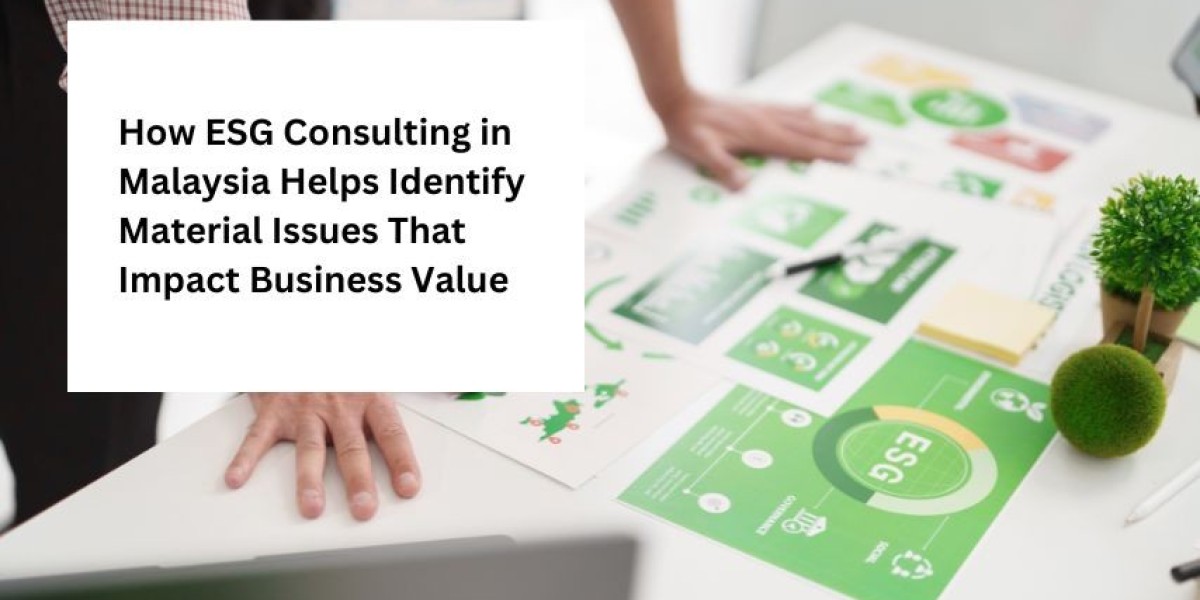Businesses worldwide are increasingly recognizing the importance of Environmental, Social, and Governance (ESG) considerations in shaping their resilience, reputation, and long-term success. Malaysia is no exception, where expert-led ESG consulting has emerged as a vital resource for businesses navigating these complex dimensions. By identifying material issues—factors that are most relevant to a company's stakeholders and financial performance—ESG consulting empowers organizations to create value while addressing environmental and social challenges.
This article unpacks how ESG consulting in Malaysia helps businesses pinpoint material issues, explores the benefits of addressing them, and highlights the critical role of ESG consultants in driving sustainable business practices.
What Are Material ESG Issues?
Material ESG issues refer to the environmental, social, and governance factors that have the most significant impact on a company's ability to create, deliver, and protect value. These issues can vary widely depending on the industry, geography, and business model but typically include topics such as:
- Environmental: Climate change, resource scarcity, pollution, and energy efficiency.
- Social: Labor practices, diversity and inclusion, community relations, and human rights.
- Governance: Corporate governance structures, board diversity, transparency, and ethics.
Identifying these material issues is the foundation for creating a robust ESG strategy. This is where top ESG consulting firms like Wellkinetics play a central role.
Why Material Issues Matter for Businesses in Malaysia
Material ESG issues are not abstract considerations; they significantly influence a company's operations, profitability, and reputation. Here's why tackling these issues is essential for Malaysian businesses:
1. Regulatory Compliance: Governments worldwide, including Malaysia, are introducing stricter environmental regulations and governance requirements. ESG strategies ensure companies stay ahead of these compliance challenges.
2. Investor Confidence: Global investors increasingly prioritize ESG factors in their decision-making. A business that demonstrates its commitment to sustainability and governance is more likely to attract investors.
3. Customer and Employee Attraction: Modern consumers prefer sustainable brands, and employees seek purpose-driven workplaces. Addressing material ESG issues can enhance brand loyalty and workforce engagement.
4. Risk Mitigation: Environmental risks, such as floods or droughts, and social risks, like poor labor practices, can severely disrupt business. Tackling these issues proactively reduces potential liabilities.
5. Long-Term Value Creation: ESG strategies align a company’s operations with sustainable growth, ensuring profitability and relevance in a rapidly evolving market landscape.
Malaysia’s ESG Landscape
Malaysia's business ecosystem is becoming progressively oriented toward sustainability. The government and regulatory bodies, such as Bursa Malaysia, emphasize ESG disclosures and practices for listed companies. For instance, the Malaysian Code on Corporate Governance outlines principles for ethical business conduct, while frameworks like the Task Force on Climate-Related Financial Disclosures (TCFD) are gaining traction.
Given this backdrop, the role of ESG consultants in Malaysia has become increasingly pivotal in helping businesses understand, evaluate, and act on material issues effectively.
How ESG Consulting Identifies Material Issues
ESG consulting firms in Malaysia employ a structured approach to identify material issues specific to each business. Here are the key steps they follow:
1. Stakeholder Engagement
Material issues are classified based on their importance to different stakeholders—investors, employees, customers, regulators, and communities. ESG consultants facilitate in-depth stakeholder discussions, surveys, and interviews to understand these varying perspectives.
For example, a manufacturing company in Malaysia might discover that environmental compliance (like waste and water management) is critical for regulators, while labor practices are top-of-mind for employees and NGOs.
2. Materiality Assessments
Through materiality assessments, ESG consultants analyze and rank ESG factors based on their relevance to stakeholders and their impact on business value. This process often integrates qualitative methods, like stakeholder feedback, with quantitative data, such as industry benchmarks and financial metrics.
3. Benchmarking Against Industry Standards
Consultants compare the company's ESG practices with peers and industry leaders to identify gaps. For Malaysian businesses, this often involves aligning with local and global standards, such as Sustainable Development Goals (SDGs) and industry-specific ESG frameworks.
4. Gap Analysis
A gap analysis is conducted to find discrepancies between the company's current ESG performance and its potential. For example, an agriculture-based firm may learn that its current water management policies fall short of global best practices, presenting an opportunity for improvement.
5. Prioritization of Key Issues
Finally, ESG consultants help organizations prioritize material issues based on their urgency, financial impact, and alignment with corporate goals. This allows businesses to focus their resources on resolving high-impact challenges effectively.
Examples of Material ESG Issues in Malaysia
1. Climate Change and Resource Management
Malaysia faces acute environmental challenges, including deforestation, urbanization, and natural disasters like flooding. Companies in sectors such as agriculture, energy, and manufacturing are more exposed to these risks. For example, palm oil producers are under increasing scrutiny for sustainable sourcing practices and deforestation-related impacts.
2. Labor Practices and Human Rights
With a diverse and multinational workforce, labor practices are a pressing issue in Malaysia. Companies must ensure fair wages, safe working conditions, and freedom of association. Violations not only result in reputational damage but also legal repercussions, particularly in industries like construction and electronics manufacturing.
3. Corporate Governance
Transparency, executive accountability, and board diversity are governance issues under the spotlight in Malaysia. ESG consultants guide companies in aligning governance structures with stakeholder expectations, fostering trust and ensuring long-term stability.
Benefits of Addressing Material Issues
Addressing material ESG issues delivers tangible benefits across multiple fronts:
1. Strengthened Stakeholder Relationships
When businesses address material issues, they build trust and credibility among stakeholders. For instance, a Malaysian retail company focusing on renewable energy may appeal to eco-conscious consumers, NGOs, and regulators alike.
2. Operational Efficiency
High energy and water consumption drive operational costs. Addressing these inefficiencies through ESG innovations can lead to cost savings while reducing environmental impact.
3. Enhanced Access to Capital
A strong ESG profile helps attract capital from global investors and lenders. Studies consistently show that ESG-compliant firms achieve lower financing costs and broader investment interest.
4. Resilience to Crises
From pandemics to climate-induced disasters, companies with proactive ESG strategies are better equipped to endure and recover from crises, ensuring business continuity.
5. Brand Differentiation
Companies that act on ESG issues differentiate themselves in crowded markets. Customers are more loyal, and employees are more engaged when they see genuine efforts toward sustainability and ethics.
Toward a Sustainable Future for Malaysian Businesses
The importance of ESG consulting in Malaysia cannot be overstated. By helping businesses identify and act on material issues, consultants enable organizations to unlock financial value, ensure compliance, and build a positive reputation. Whether addressing climate risks in agriculture, improving labor practices in manufacturing, or strengthening corporate governance, ESG strategies pave the way for resilient and purpose-driven companies.
The era of ESG is here to stay, and Malaysian businesses well-positioned to innovate and adapt will reap the rewards—not just financially, but in creating a legacy of sustainability and trust. As companies strive for greatness in an evolving global landscape, the expertise of ESG consultants remains an invaluable compass guiding them toward a balanced and responsible future.








